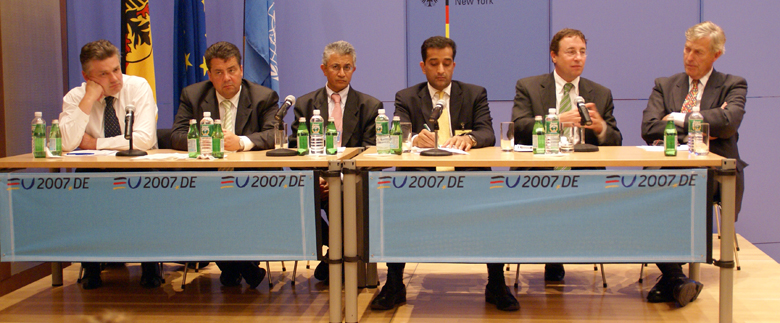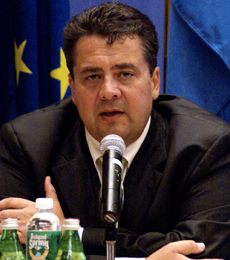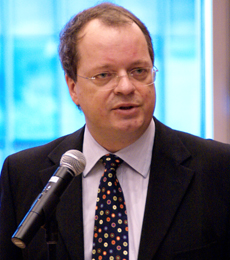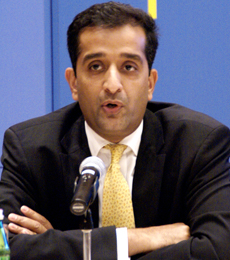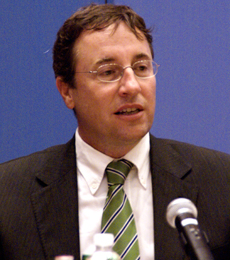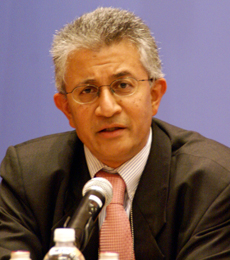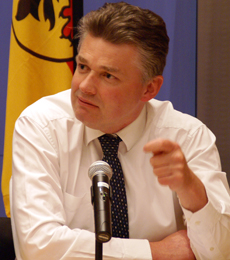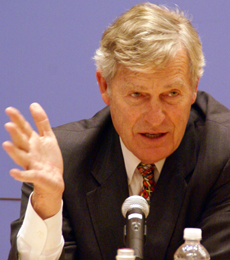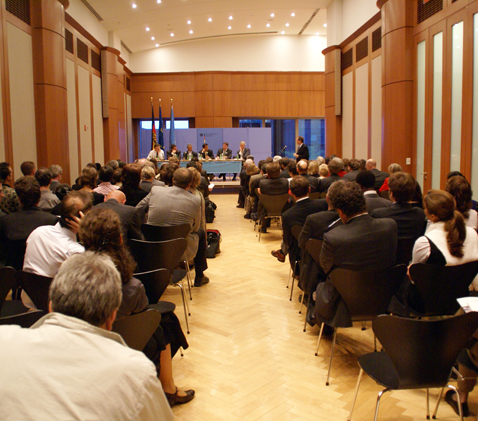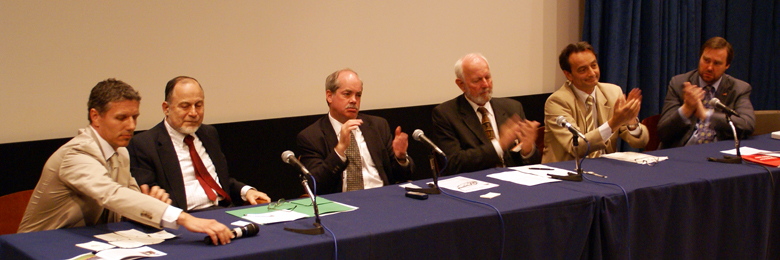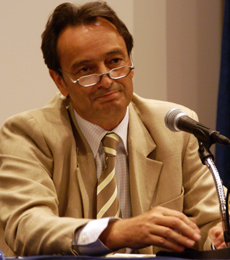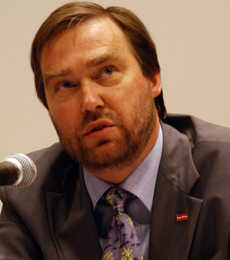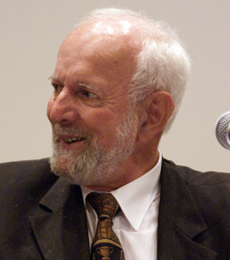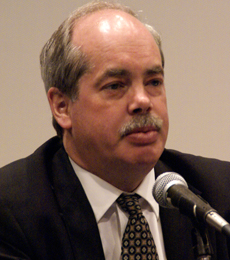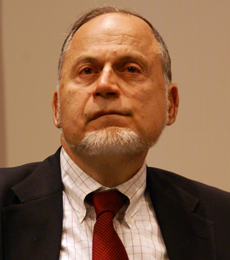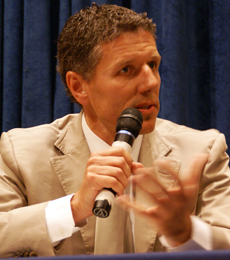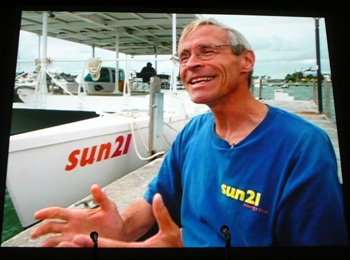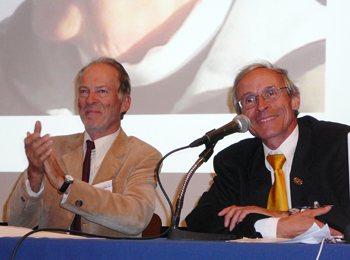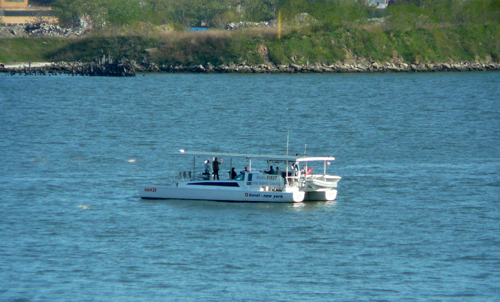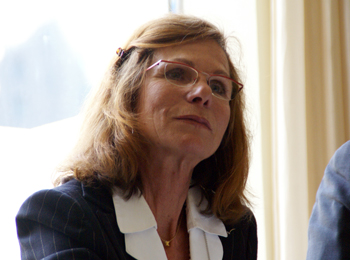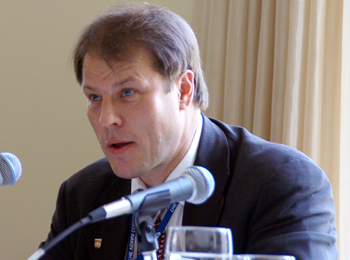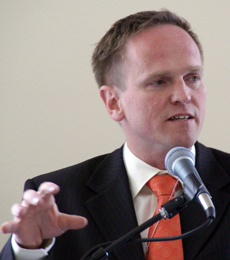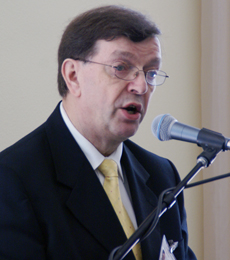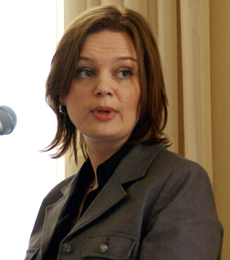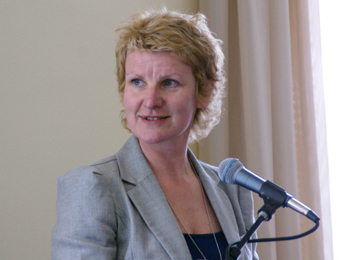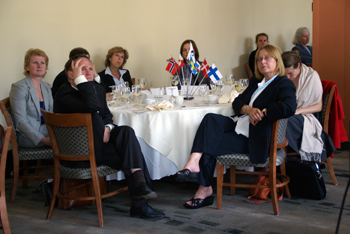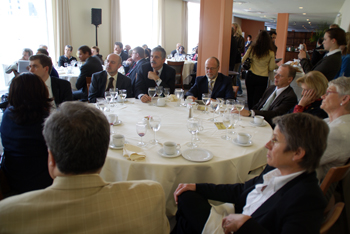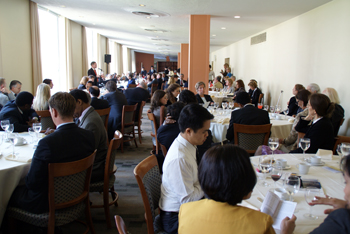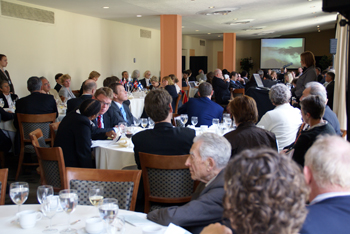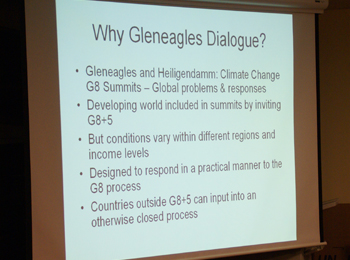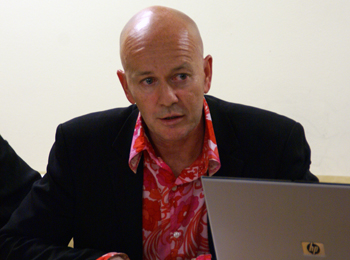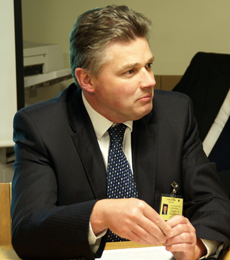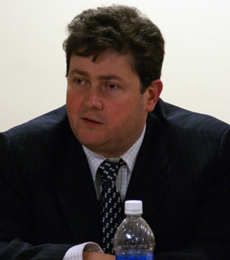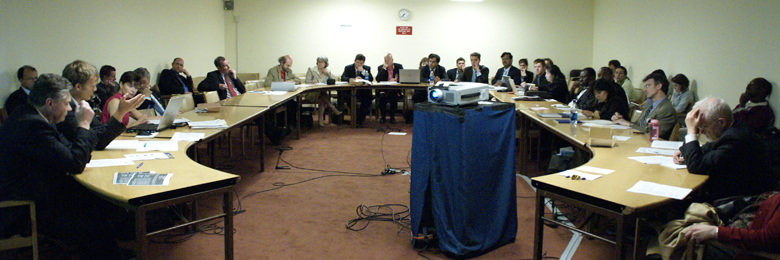 |
||
|
published by IISD, the International Institute for Sustainable Development
in cooperation with the UNDP Secretariat |
|||
|
Special Report on Selected Side Events at the Fifteenth Session of the Commission on Sustainable Development (CSD-15)
|
|||||
| 30 April - 11 May 2007 | United Nations headquarters, New York | |||||
 |
 |
|||
 |
||||
Events convened on Wednesday, 9 May 2007
|
Sigmar Gabriel, Federal Environment Minister of Germany, highlighted two great challenges: increasing access to resources despite exponential population growth; and producing enough energy to meet future demands without damaging the climate. He said that the same answer applies to both questions: utilize energy more efficiently and switch to a greater use of renewable energy, and accomplish this through technological innovation. Panel Discussion: R. Andreas Kraemer, Ecologic, moderated the panel discussion. Noting the high potential for renewable energy in Pakistan, Malik Amin Aslam, Minister of State for Environment, Pakistan, said that financing has been the largest impediment to providing rural areas with access to renewable energy, since the policy and tariff frameworks are not in place. Valli Moosa, Non-Executive Chairman, Eskom, emphasized the responsibility of both developing and developed countries to address climate change by implementing energy efficiency measures. He highlighted a number of energy efficiency strategies in South Africa, including that Eskom has given away 5 million free compact fluorescent lights to deal with power shortages, and has provided businesses in Cape Town with protection from load shedding if they limit their energy consumption to a specific level. Achim Steiner, Executive Director, UNEP, highlighted the global consensus on the macroeconomic returns of energy efficiency and renewable energy, but noted that these are not being implemented at the national level. He hoped that regions on the verge of infrastructure booms, notably Africa, would not get locked into the old energy infrastructure and would instead take advantage of the new technological and economic frontiers. Ian Pearson, Minister for Climate Change and the Environment, UK, agreed with Steiner on the need to avoid locking out new low-carbon technologies, which he said can occur due to market failure. He highlighted the need for a global carbon price, along with a mix of regulations and price signals. Timothy Wirth, President, UN Foundation, spoke on the need to “get the carbon price right,” and develop long-term environmental policies, such as Brazil has done for biofuel. Participants discussed, inter alia: the willingess of governments to address aviation emissions; the viability of carbon certificates; and intellectual property rights limiting access to technology. |
||||
|
|||
|
Peter Maurer, Permanent Representative of Switzerland to the UN, proudly reported that the solar-powered boat “Sun-21” recently completed a transatlantic journey from Basel, Switzerland to New York, demonstrating the power of clean energy technology.
Ernst von Weizsäcker, University of California, said that the voyage, and other recent political and technological developments, could presage a shift to a new world of solar energy. Richard Cherry, Community Environmental Center, New York City, said that New York is an icon of its nation and needs to remain a center of innovation and leadership. He announced the development of “Solar Two,” a carbon-neutral building to be located on the banks of the East River, featuring geothermal wells, insulating vegetation, skylights, stormwater plumbing, and solar cells that produce more power than the building uses. Christopher Flavin, President, World Watch Institute, noted the tremendous surge in recent economic growth and carbon emissions in China. He said that government officials and the private sector in China are very interested in applying the technologies of the future, and that countries such as the US could become more influential by setting a good domestic example and demonstrating a genuine effort to become cleaner and more modern. Wilfrid Le Naour, CEO of Somfy SA, highlighted that well-designed energy-efficient buildings are more comfortable and healthy to work in, but that most buildings are still being constructed inefficiently. He said that real gains would be made once sustainable products and practices can be mainstreamed. Christoph von Arb, Swiss House for Advanced Research and Education, outlined the “Think Swiss – Brainstorm the Future” programme in Boston, US, to attract students towards working in fields of innovation and research to face the challenges of building a sustainable world. René Kamm, CEO of Messe Schweiz, a Basel-based exhibition company, said that Basel received a 2007 European Clean Energy award, and that the city was an ideal venue for trade fairs and exhibitions on renewable technologies. In conclusion, panelists said that the real challenge is mainstreaming energy efficiency and renewable energy developments to the 6 billion people in the developing world. Following the panel presentations, attendees watched a short film recounting the journey of the “Sun-21,” and discussed aspects of the voyage with Martin Vosseler and Beat von Scarpatetti, two of the boat’s Swiss crew members. |
|||
|
Following the panel presentations, attendees watched a short film recounting the journey of the “Sun-21.”
|
|||
|
|||
|
On behalf of the Nordic Council of Ministers, Jukka Uosukainen, Ministry of the Environment, Finland, welcomed people to the event, which aims to present the cooperation between the Nordic countries and their common efforts towards sustainable development and growth. Paavo Väyrynen, Minister for Foreign Trade and Development, Finland, emphasized that the Nordic countries have managed to succeed at both economic growth and environmental sustainability and believed the model could be marketed. He addressed the need to promote renewable energies, energy efficiency and energy saving, and said his country is trying to ensure that emissions-reduction projects implemented with Finnish financing in developing countries reduce poverty and promote sustainable development. Connie Hedegaard, Minister for Nordic Cooperation and Environment, Denmark, emphasized the need to immediately reduce carbon emissions by increasing energy efficiency and switching to lower carbon technology. She hoped that the EU’s new climate policy targets would spur international negotiations forward, and called for a global climate policy framework beyond 2012 that aligns with the EU’s target of 30% emissions reductions by 2020. She closed by saying that over the last 25 years, Denmark’s GDP grew 70% without an increase in energy consumption. Ola Alterå, State Secretary to the Minister for Enterprise, Energy and Communications, Sweden, said that the experiences of Sweden and other Nordic countries have demonstrated that economic growth and the reduction of greenhouse gas emissions can be accomplished concurrently through a mix of policy tools such as a carbon tax, use of combined heat and power, and energy efficiency and renewable energy targets. Anita Utseth, State Secretary of the Ministry for Petroleum and Energy, Norway, discussed carbon capture and storage (CCS), which the Norwegian Government believes has great potential for greenhouse gas emission reductions. She highlighted a new national policy for all new gas-fired power plants to have CCS technology and described the Mongstad, Karsto and Halten CO2 Projects to develop CCS. Helga Baròadóttir, Special Adviser for the Ministry of Industry and Commerce, Iceland, said that geothermal and hydropower generate 72% of the population’s total energy consumption, and noted that geothermal energy in particular can provide millions of people with secure energy in many developed and developing countries. |
|||||
|
|||
|
Peter Ritchie, Chatham House, explained that the G8 Gleneagles Dialogue is an informal dialogue between the G8 and other large energy-producing countries on how to address the challenge of climate change. He emphasized the need to engage effectively with civil society and ensure that their input is timely and has influence.
José Alberto Garibaldi, Energeia, said that civil consultation processes showed that the current responses to climate change are too small and need to be replicated and scaled up. He lamented that addressing climate change is often seen as a cost, and stressed that delaying a response increases the eventual costs. Ian Pearson, Minister for Climate Change and the Environment, UK, said that business and citizens must be involved in climate change consultations, as their actions will be vital for delivering cuts in emissions. Diego Arjona, Ministry of Energy, Mexico, gave examples showing that public-private partnerships are more successful than governments acting alone, and said that efforts to address climate change need to achieve social acceptance and be profitable. Ancha Srinivasan, IGES, spoke of the need to improve energy efficiency and renewable energy in Asia, adding that many in the region feel that intellectual property barriers unfairly limit technology transfer, and that more assistance on adaptation and mitigation is needed. Ewah Eleri, International Centre for Energy, Environment & Development, Nigeria, reiterated that in Africa, key actors beyond the state, such as international development agencies, the World Bank and major corporations, all need to be included within the dialogue. Joseluis Samaniego, Economic Commission for Latin America and the Caribbean, stated that in Latin America adaptation is a higher priority than mitigation, and involves not only adapting to increased disasters but also facing change in economic structures. Participants discussed the pros and cons of dealing with climate change through an “elite club” like the G8, with some stressing the advantages of keeping pressure on powerful governments, but others cautioning that such a process risks neglecting developing countries and the poor. |
|||
|
|||
|
||
|
Click the above button to go back to our ENB main coverage
|
||
|
|
|
|
|
||
|
